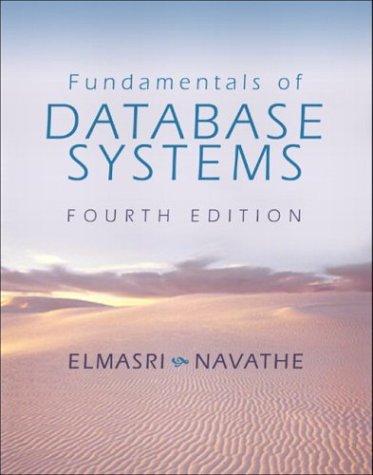Question
Part 1: Implement the methods in the Undirected Graph class. The methods must make use of the data structure given in the class. Part 2:
Part 1: Implement the methods in the Undirected Graph class. The methods must make use of the data structure given in the class.
Part 2: Implement a main method in the Undirected Graph class. I have given you part of main. You must complete the part that builds the graph from the input. The input to the main method will come from a text file whose name is given in a command line argument. Triangle Counting Algorithm triangleCount = 0
for each vertex, v1, in the graph {
for each vertex, v2, in the orderedNeighbors of v1 { triangleCount = triangleCount + the number of
} }
elements in the intersection of the orderedNeighbors of v1 and the orderedNeighbors of v2
Create Ordered Neighbor Sets for each edge (v1,v2) in the graph {
if (degree(v1) < degree(v2)) or (degree(v1)==degree(v2) and v1 < v2)
add v2 to the orderedNeighbors of v1 else
add v1 to the orderedNeighbors of v2 }
import java.io.IOException;
public class UndirectedGraph {
private class Vertex {
private EdgeNode edges1;
private EdgeNode edges2;
private int numNeighbors; // This is the same as the degree of the
// vertex private int orderedNeighbors[];
// //Set of ordered neighbors
// We will learn others ways to store sets but for this assignment //you
// must store the set in an array
private Vertex() {
}
}
private class EdgeNode {
private int vertex1;
private int vertex2;
private EdgeNode next1;
private EdgeNode next2;
private EdgeNode(int v1, int v2, EdgeNode e1, EdgeNode e2) { // PRE: v1
// < v2
// Each edge node is stored only once but it will be part of two
// lists }
}
private Vertex[] g;
}
public UndirectedGraph(int size) {
// Create a graph with size vertices
// The vertices will be identified by ints between 0 and size-1 //The
// vertices are stored in a array
g = new Vertex[size];
for (int i = 0; i < size; i++) {
g[i] = new Vertex();
}
}
public void addEdge(int v1, int v2) { // add a new edge between v1 and v2
}
public void printNeighbors() {
// print the neighbors of each vertex to standard output
// this will be useful for checking if you built the graph correctly
// //there should be one line for each vertex
// the format of the line should be vertex name: comma delimited list of
// //neighbors
}
private void populateOrderedNeighbors() {
// find the ordered neighbors of each vertex
// each orderedNeighbor set should be sorted in ascending order
}
private int intersectionSize(int v1, int v2) {
return v2;
// find the number of elements in the intersection of the
// orderedNeighbors //of v1 and the orderedNeighbors of v2
// your code must make use of the fact that the orderNeighbor sets are
// //sorted in ascending order
}
public int countTriangles() {
return 0;
// return the number of triangles in the graph
}
public static void main(String args[]) throws IOException { //build the graph and find the number of triangles
UndirectedGraph g = null;
//build the graph
g.printNeighbors(); //put this line in a comment before sending
//me your homework
System.out.println("The number of triangles is" +g.countTriangles());
}
}
Step by Step Solution
There are 3 Steps involved in it
Step: 1

Get Instant Access to Expert-Tailored Solutions
See step-by-step solutions with expert insights and AI powered tools for academic success
Step: 2

Step: 3

Ace Your Homework with AI
Get the answers you need in no time with our AI-driven, step-by-step assistance
Get Started


